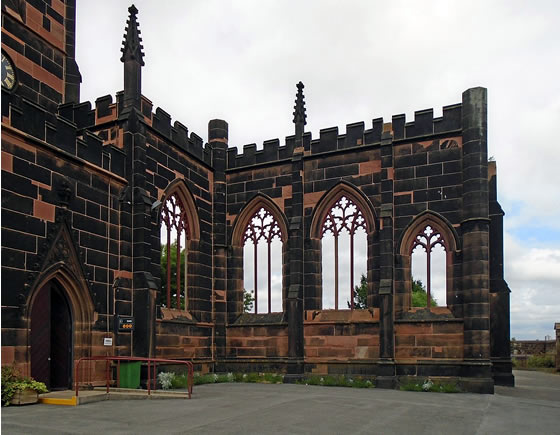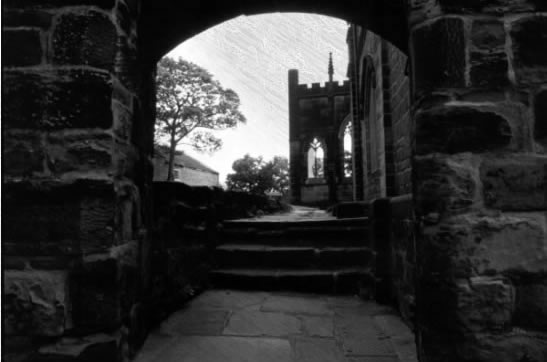

Actually standing on Prince’s Dock – or at least on a glass floor a few feet above the water – was strange enough for Marion. She noted that the water was incredibly clean. She could see straight down to the bottom of the man-made harbour built for Atlantic liners crossing to America in the days before long haul air travel. The old concrete must have been replaced long ago, and a rather beautiful fresco depicting the history of Liverpool Docks had been painted on the new floor before the water was let into it again.
She stopped looking at the view beneath her feet as the steward called passengers to board the waiting tram. It was the length of a bus from Marion’s era, a double-decker bus at that, with an enclosed bottom and an open-topped upper deck. Marion looked at the glass stairs up to that level hopefully.
“Yes, the view is fantastic from up there,” Margery told her. “But keep your shawl tight around your shoulders. It can be a little breezy. The middle of the river gets REAL winds no matter what they do with the climate control.”
They were, of course, two very rich couples, and Margery’s family at least were known in this twenty-eighth century Liverpool, but they did not pull any favours with the tram conductor. It was just a matter of luck that they got the four seats right at the front with a half-height window to protect them from that breeze Margery had mentioned but otherwise the very best view of it all.
As the tram slowly ascended towards the highest point in the gracefully arched bridge Marion couldn’t help thinking it was less like a mode of transport and more like the start of a white knuckle ride at the seaside. She almost expected the tram to take a breathtakingly steep plunge when they reached the top. She was almost braced for it, and was a little surprised when it didn’t happen. She looked over the side and saw the gap in the water where the gravity field supported the bridge. Looking down like that it was even stranger than looking at it from the waterside. It was a little eerie, in fact. She turned her attention to the view ahead.
They were at the halfway point, now. The waterfront of Birkenhead was never as prominent or distinctive as the view behind her of Liverpool, even so she expected to recognise familiar landmarks. Some of them she did. The old Town Hall that had been turned into a museum of the Wirral in her own time was easily spotted with the cupola on top of its classical clock tower. The Italianate tower of Hamilton Square railway station was immediately recognisable, too. So was the Central Hydraulic Tower that had been built in the elegant style of the Palazzo Vecchio in Florence even though its mundane purpose was to pump water into the locks at the East and West Float.
Marion identified all three of those landmarks even from the middle of the river. Lady Margery confirmed that the Town Hall was still a museum, and the railway building was an art gallery. They stood at either end of a park. The old Hydraulic Tower was incorporated into a private house that stood on its own island in the middle of the leisure lake created by joining the East and West Float docks and hollowing out all the land up to the old Birkenhead Park. Marion knew that had been done, but she wasn’t sure how she felt about it. The street where she had lived was demolished to make that lake. She was glad they weren’t visiting that today. She still had time to get used to the idea.
Apart from those remnants of nineteenth century industrial Birkenhead, the art deco ziggurat of the Woodside ventilation tower was easily the most recognisable landmark on that side of the river. Marin knew it well. As a little girl she had imagined much more noble purposes for the building – as a cathedral or a great concert hall. She remembered being a little disappointed when she found out what it was really for. But it remained an important icon of her childhood and youth and she was pleased that it was still there in this twenty-eighth century.
That landmark was an integral part of the bridge, which ended not with a gentle slope down to the ground, but at the very top of the tower before the tram descended vertically down a glass shaft just like a lift. The art deco details of the tower that Marion had only looked at from the ground before were close up and she appreciated that unique view thoroughly.
“Yes, it seemed like a good way to integrate the old and the new,” Margery said as they stepped off the tram into the glass roofed terminus at the Woodside end of the journey. “Otherwise it would have been in the way and they might have demolished it.”
“I’m glad they didn’t,” Marion said. “I would have missed it.”
Outside the place was very much different than she remembered. She had been prepared for that. Margery had told her how very gentrified this side of the river was, now. Even so, the absence of any trace of the old riverside industry that was the reason Birkenhead existed was startling. Where there had been wharves and warehouses there was now a sculpture garden and a café. It all looked very pretty. Marion knew it would be pleasant walking there in the gentle gardens, but she couldn’t help a twinge of regret for the long gone heritage.
A car was waiting – a limousine. Such things had long since stopped surprising Marion. She travelled in the back of limousines as often as she drove her own more modest car. At least this one didn’t have an escort of Presidential Guards.
It was a hover car, of course, travelling some fifteen feet above the ground. It followed the clearly laid out roads, though. Marion tried to work out which roads they were, but she had no terms of reference at all. Apart from those few distinctive landmarks she recognised nothing of the town she was born in.
She couldn’t even see much of a town. Birkenhead hardly seemed to exist anymore. The whole place seemed to have been levelled to extend the parks and gardens. It was all very beautiful, but Marion couldn’t stop wondering where all the people lived, now.
She finally recognised part of a landmark when the car reached Margery’s family home, The Priory. A great deal of the building was made of glass, of course. The wealth that made it possible for them to live in a fine house like this came from her grandfather’s invention, so it was inevitable that it would be used to construct whole walls and a sloping roof over what proved to be a very grand, very light and airy drawing room where Margery’s elderly parents and her older brother greeted their guests and invited them to take tea.
The part of the house that wasn’t made of glass was made of very old stone that had been carefully preserved and integrated into the structure. As she drank tea and ate finely made smoked salmon sandwiches Marion looked at the long back wall of the drawing room. It had three tall arched windows of the style she thought might be called ‘English Gothic’ or possibly even Anglo-Saxon. Certainly they were already centuries old in her own time when the ornate leading was empty of glass. Now they were fully glazed and the stonework covered in cool white plaster, but she recognised something of it all the same.
“This IS the old Priory,” she said. “Your house is built from the remains of St. Mary’s Priory Church.”
“Yes,” Lady Anna Lewis answered her proudly. “I was only five years old when it was built. I remember being a little sorry that the spire had to be removed from the structure. It had become unsafe. But we saved the tower itself. When I was a girl my bedroom was in the top floor. Margery had it when she was a girl. Now I have the same room as a sewing room. I love to sit there and embroider while looking out over the view.”
“That’s… wonderful,” Marion told her. “You preserved so much of the old building. It is a lovely house. You must have been happy living here.”
“Yes,” Lady Lewis said. Margery agreed. She was born in this house. The ancient walls that made up part of it were something she took for granted. “Oh, yes, very happy.”
“Where is your family home, my dear?” Lady Lewis added. Marion was more than a little taken aback by the question, especially when she remembered that the street she grew up in used to be less than a mile away from here.
“I don’t have one,” she admitted after more of a pause than was completely sociable. “My home is with Kristoph, now, on Gallifrey.”
Lady Lewis obviously realised she had made a mistake. She poured more tea and passed a cup to Marion first. She asked her son-in-law about his work on Ventura. For a while everyone talked about the recent crisis on that planet and the part the Earth and Gallifreyan Ambassadors had played in resolving it. Marion was able to talk about how clever and resourceful Kristoph had been and not think about what was bothering her.
But she knew she had to talk about it to somebody. Margery noticed it and discreetly proposed taking her to see the view from the sewing room in the tower. That was her chance to get away from polite conversation and speak her mind.
It really was a magnificent view. She could see all the way across the Mersey, back to Pierhead and its famous architecture. She could see the bridge and the tram making its way back across the river. She could also see the envirodome stretching up and down river, ensuring good weather and calm water within its protection.
“You’ve not quite been happy about this trip, have you?” Margery told her. “It wasn’t what you expected?”
“No,” Marion answered her. “It’s… EXACTLY what I expected. And… I feel exactly how I thought I would feel about it… sad… and… regretful.”
She looked out of the window again. The house was surrounded by lawns and paths between carefully sculptured hedges and flower beds, tennis courts, an orchard, the gardens that went with a mansion of this sort. Marion was used to seeing just this sort of garden around Mount Lœng House on Gallifrey, except that the Lœngbærrow demesne stretched even further than her eye could see. The Mersey marked the boundary of the Lewis property.
“I am starting to sound like a stuck record, saying ‘in my day’ every five minutes,” she sighed. “And I’m going to say it again now. In my day, the ruins of the priory were almost entirely surrounded by the Cammell Laird shipyard. That’s why it fell into ruin in the first place. Because there were no parishioners. But thousands of people worked there. Nearly every adult male I knew in my street had a job there. Hundreds more came from Liverpool every day to work. In the heyday of the yards the Mersey Ferry was the way most of them got to work. Throngs of them arrived at Woodside in the morning and went home at the end of the day.”
“Yes,” Margery admitted. “I’ve seen photographs. But nobody builds ocean-going ships anymore. Not now we have the troposphere shuttles that can get all the way to Australia and back in a few hours. And those are built on the moon.”
Marion absorbed that information before going on with what she had to say.
“I understand that in a way, It’s not that I really expected Cammell Laird to be here, still. They were in trouble by the early 1990s anyway, scaling down production. Everyone expected them to close sooner or later. There were no more jobs for life for working men there. But I really didn’t expect it to be so fully obliterated. All of the docks have been filled in. The stables and paddock for your family’s horses are where the construction sheds used to be…. where the hulls of ships and submarines were built.”
“We didn’t put people out of work. This was all wasteland before my family came to live here. The shipyards WERE long gone.”
“Oh, I’m sure. But where did all the PEOPLE go? Why is it possible for Birkenhead to be nearly all parkland with a few big houses here and there? Where do ordinary people live?”
“The population is much smaller than it was in your day, Marion,” Margery answered. “There is no need for thousands of people to live and work in once place like they used to.”
“Why is it smaller? Did something happen? A plague or something?”
“No. It’s just… oh dear, THAT aspect of history isn’t my strong point. Ask me about glassmaking in Merseyside and I can go on for hours, but demographics are another thing. But since the twenty-fifth century the population of Earth has been decreasing. Partly it is because we have colonies now. I think something like four billion Earth-born humans and their families live on other planets. Then family sizes have been smaller than they were in your time for many generations. There was never any legal restriction, but it became unfashionable to have more than two children. Now that it is possible to choose the sex of a baby before conception most families consist of one boy and one girl – like Geoffrey and myself. And it stands to reason – for about six or seven generations now couples have only had two children – eventually replacing themselves in the population. That means the population remained static. That, along with the immigration to the colonies means less people with more space to live in. Birkenhead simply wasn’t needed as a town as such.”
Marion’s head was spinning. She could barely take it all in. Everything was SO very different.
Too different.
She wanted to cry. It was just too much to take in at once, too many changes, too much that she had taken for granted that had changed completely. Yes, it had changed for the better in so many ways. But all the same she felt strange about it.
She didn’t cry. She was the wife of the Lord High President of Gallifrey and she kept her dignity. But the feeling remained.
“I feel the same when you talk about Liverpool in your time,” Margery told her, much to her surprise. “When I think of it crowded with people, when I try to imagine the view out there as you know it, I want to cry, too. But it’s also a little exciting, thinking of it.”
“Your world is exciting,” Marion admitted. “It’s all absolutely fantastic. It’s wonderful to see how inventive humans are, and that we actually manage to improve our world rather than ruining it. I just felt a bit overwhelmed by it all.”
“I think…” Margery said. “Mama expects us to stay a few days, and I do want to show you around a bit more. I hope you will enjoy it. But afterwards… after you’ve seen my Merseyside, I think I ought to see yours. I think Kristoph should take us all back to when there was a shipyard down there on our tennis courts and… oh, I don’t know… when the Beatles played in the Cavern.”
Marion laughed.
“That’s actually BEFORE my time,” she said. “The 1960s. Liverpool was completely different THEN to when I lived there.”
“Well, let’s go and see a time that is different for BOTH of us,” Margery said. “Meanwhile, mama wants to be a gracious host to her honoured guests. We do have some important people among our social circle, but she has never actually had a President of a whole planet visit before. She would be distraught if she thought you weren’t perfectly happy here.”
“Then I will BE perfectly happy,” Marion assured her friend.

 |
 |
 |